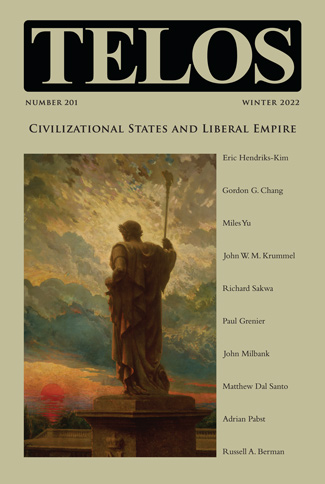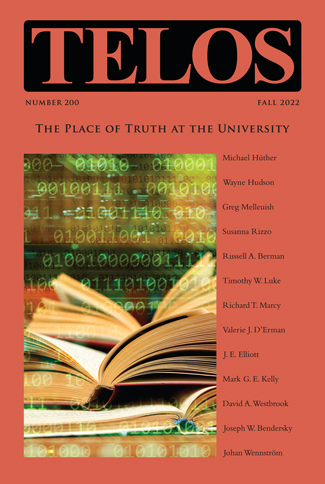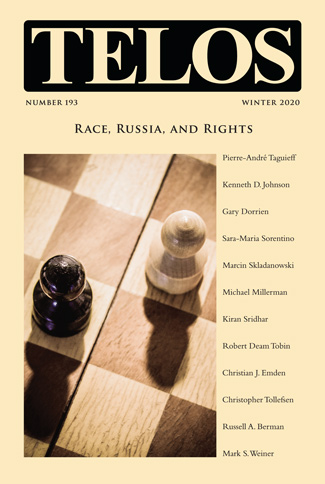By David Pan · Friday, October 13, 2023  Hamas’s horrifying attack on Israeli civilians is a continuation of terrorist methods that it has been using for years against Israel. As a technique of war, its terrorism functions primarily as a way of gaining support from current and potential allies. Such a massacre can only serve Hamas’s war aims to the extent that the use of terror as a technique of war points to an ideological similarity with its allies, Iran and Hezbollah. Hamas’s use of terror only makes sense because the allies it is trying to convince—anti-Semitic populations and terrorists in the Arab world as well as totalitarians everywhere—share their disregard for principles of human rights as well as their use of fear and hatred as the primary determiners of political life. Terrorism only works for Hamas insofar as it can appeal to similar inclinations in others in order to build a broader alliance of terrorist movements and totalitarian states. Hamas’s horrifying attack on Israeli civilians is a continuation of terrorist methods that it has been using for years against Israel. As a technique of war, its terrorism functions primarily as a way of gaining support from current and potential allies. Such a massacre can only serve Hamas’s war aims to the extent that the use of terror as a technique of war points to an ideological similarity with its allies, Iran and Hezbollah. Hamas’s use of terror only makes sense because the allies it is trying to convince—anti-Semitic populations and terrorists in the Arab world as well as totalitarians everywhere—share their disregard for principles of human rights as well as their use of fear and hatred as the primary determiners of political life. Terrorism only works for Hamas insofar as it can appeal to similar inclinations in others in order to build a broader alliance of terrorist movements and totalitarian states.
This terrorist approach to politics defines the asymmetry in the conflict between Hamas and Israel. In contrast to Hamas, Israel and its main ally, the United States, are committed to protecting human rights, even in the face of terrorist enemies. Without such self-control, Israel could destroy Hamas by conducting the same kind of indiscriminate killing of Palestinians that Hamas has used against Israel. There is no doubt that if Hamas had the means at its disposal, it would not hesitate to kill the entire population of Israel. But in eschewing such terrorist methods, Israel ends up being attacked for its failures to live up to the human rights principles that it espouses. In its commentary on the conflict, Human Rights Watch focuses primarily on the Israeli siege of Gaza as a war crime while treating Hamas’s massacres of Israelis merely as the work of “individuals” who “should be brought to justice.”[1] Perversely, Israel loses legitimacy due to its general support for human rights, even as it struggles to balance a respect for human rights with its need to fight for its existence against the terrorists and totalitarians that surround it. Meanwhile, Hamas is not considered to be the political leadership of Gaza but as a set of bad individuals to be differentiated from the Gazan population. Clearly, Hamas’s use of Palestinians as human shields indicates how its terrorism translates into totalitarian rule within Gaza. Yet to treat the Palestinians as victims and Hamas as a few bad individuals ignores the political reality that Hamas constitutes the elected political authority of Gaza and recruits its fighters from the Gazan population that supports it.
Continue reading →
By Telos Press · Monday, March 20, 2023 In today’s episode of the Telos Press Podcast, David Pan talks with Eric Hendriks-Kim about his article “The Polemics of China’s Counter Cosmopolitanism,” from Telos 201 (Winter 2022). An excerpt of the article appears here. In their conversation they discuss the impetus behind the current proliferation of Chinese theories of cosmopolitanism; how these new ideas about cosmopolitanism fit into a history of anti-Western forms of universalism in various parts of the world; the idea of tianxia, its meaning and history, and how it is used today; how Jiang Shigong’s idea of socialism with Chinese characteristics differs from the theories based on the idea of tianxia; how Jin Huimin conceives of the relationship between universalism and particularity; the relationship of these Chinese notions of cosmopolitanism to Western notions of cosmopolitanism; and whether any of these conceptions escape from an imperialist perspective. If your university has an online subscription to Telos, you can read the full article at the Telos Online website. For non-subscribers, learn how your university can begin a subscription to Telos at our library recommendation page. Print copies of Telos 201 are available for purchase in our online store.
Continue reading →
By David Pan · Monday, January 16, 2023 Telos 201 (Winter 2022): Civilizational States and Liberal Empire is now available for purchase in our store. Individual subscriptions to Telos are also available in both print and online formats.
 In concluding that “All political action has then in itself a directedness towards knowledge of the good: of the good life, or of the good society,” Leo Strauss describes an essential link between power and values. Because the power to make decisions about our future cannot be separated from the fundamental goals and ultimate meaning of our lives, we cannot exercise power that would be divorced from some set of values. Even the narrowest understanding of self-interest must come to terms with one’s own mortality and the meaning of others for our own existence. Consequently, raw power does not exist, as it can only be exercised within some understanding of its purposes. In concluding that “All political action has then in itself a directedness towards knowledge of the good: of the good life, or of the good society,” Leo Strauss describes an essential link between power and values. Because the power to make decisions about our future cannot be separated from the fundamental goals and ultimate meaning of our lives, we cannot exercise power that would be divorced from some set of values. Even the narrowest understanding of self-interest must come to terms with one’s own mortality and the meaning of others for our own existence. Consequently, raw power does not exist, as it can only be exercised within some understanding of its purposes.
When we consider the way in which power functions on a global level, it will also be crucial to understand how a world order will reflect a particular way of structuring the relationship between values and power. Even the seemingly most egregious use of power can only take place within the framework of an attempt to realize values in the world, and realist accounts of global order must also recognize the importance of some ideology such as nationalism as a means of establishing political values. Accordingly, discussions of balance-of-power dynamics can only begin once great powers emerge as a consequence of the political will of certain peoples to understand themselves in a certain way. Based on such measures as GDP, population, and military spending, Russia does not rank particularly well in relation to countries such as Brazil and India, neither of which pretends to great power status. If Russia can be considered a great power today, it is primarily because of the goals and values that its government embodies. Values form the foundations of global order, and Russia only continues to project its power because it maintains a sense of the global reach of its values for determining order for others.
Continue reading →
By David Pan · Monday, October 3, 2022 Telos 200 (Fall 2022): The Place of Truth at the University is now available for purchase in our store. Individual subscriptions to Telos are also available in both print and online formats.
 The place of truth at the university has always been elsewhere. Scientific conclusions are after all hypotheses, subject to continuing examination and critique in a process that forever defers the arrival at a final truth. In addition to this unbridgeable temporal distance from truth, there is a spatial distance to the extent that the university is subject to a larger purposive context that stands outside of scientific activity itself. A researcher can be objective by being non-prejudicial in collecting facts and weighing arguments but can never be neutral in terms of the goals of the research, which must always be established before the research begins and from outside of the research project itself.[1] Research cannot begin until an interest in some question has been expressed, and such an interest has generally not been up to the researcher to decide. Whether the goal of medical research will be to protect humans from a virus or attack humans with a virus will be determined by the sponsor of the research rather than the researcher, who at best may decline to take part in some forms of research. If the determiners of the goals of the university are not the professors themselves but the society that sponsors their work, it is within this external values framework that the truth of the university must be found. The place of truth at the university has always been elsewhere. Scientific conclusions are after all hypotheses, subject to continuing examination and critique in a process that forever defers the arrival at a final truth. In addition to this unbridgeable temporal distance from truth, there is a spatial distance to the extent that the university is subject to a larger purposive context that stands outside of scientific activity itself. A researcher can be objective by being non-prejudicial in collecting facts and weighing arguments but can never be neutral in terms of the goals of the research, which must always be established before the research begins and from outside of the research project itself.[1] Research cannot begin until an interest in some question has been expressed, and such an interest has generally not been up to the researcher to decide. Whether the goal of medical research will be to protect humans from a virus or attack humans with a virus will be determined by the sponsor of the research rather than the researcher, who at best may decline to take part in some forms of research. If the determiners of the goals of the university are not the professors themselves but the society that sponsors their work, it is within this external values framework that the truth of the university must be found.
Continue reading →
By David Pan · Monday, July 18, 2022  The extended nature of the war in Ukraine stems from the long-term political and ideological developments that have led up to it and will continue to dominate it. In Russia, the government has maintained support for the war through the promotion of a civilizational narrative about Russian culture that has been established over the last twenty years. As Marcin Skladanowski describes in “Criticism of Western Liberal Democracy by Patriarch Kirill of Moscow and All Rus'” (Telos 193), the Russian Orthodox Church has set up the conflict between Russia and the West as a moral one, in which Russia defends a divinely grounded morality against the amoral secularism of the West. This religiously grounded idea of a civilizational conflict exists alongside a philosophical explanation. In “The Ethnosociological and Existential Dimensions of Alexander Dugin’s Populism” (Telos 193), Michael Millerman describes Dugin’s Heideggerian attempt to establish civilizational differences between peoples as the basis for an anthropological theory of human existence. As Nikolai-Klaus von Kreitor recounts in “Elements of the New Russian Nationalism” (Telos 96), Dugin was already at work in the early 1990s on such ideas when he developed Carl Schmitt’s theory of the Grossraum in order to criticize U.S. imperialism and justify a Eurasian regional hegemony to counter the dominance of the Western liberal order. The extended nature of the war in Ukraine stems from the long-term political and ideological developments that have led up to it and will continue to dominate it. In Russia, the government has maintained support for the war through the promotion of a civilizational narrative about Russian culture that has been established over the last twenty years. As Marcin Skladanowski describes in “Criticism of Western Liberal Democracy by Patriarch Kirill of Moscow and All Rus'” (Telos 193), the Russian Orthodox Church has set up the conflict between Russia and the West as a moral one, in which Russia defends a divinely grounded morality against the amoral secularism of the West. This religiously grounded idea of a civilizational conflict exists alongside a philosophical explanation. In “The Ethnosociological and Existential Dimensions of Alexander Dugin’s Populism” (Telos 193), Michael Millerman describes Dugin’s Heideggerian attempt to establish civilizational differences between peoples as the basis for an anthropological theory of human existence. As Nikolai-Klaus von Kreitor recounts in “Elements of the New Russian Nationalism” (Telos 96), Dugin was already at work in the early 1990s on such ideas when he developed Carl Schmitt’s theory of the Grossraum in order to criticize U.S. imperialism and justify a Eurasian regional hegemony to counter the dominance of the Western liberal order.
Continue reading →
By Telos Press · Monday, July 4, 2022 In today’s episode of the Telos Press Podcast, David Pan talks with Courtney Hodrick about her article “From Neoreaction to Alt-Right: A Schmittian Perspective,” from Telos 198 (Spring 2022). An excerpt of the article appears here. In their conversation they discuss Carl Schmitt’s understanding of the relationship between liberalism and democracy, and how the separation of the two from each other leads to two versions of extreme right thinking; the general outlines of Mencius Moldbug’s rejection of politics in favor of markets and the relationship between this approach and Schmitt’s understanding of politics as based in the friend/enemy distinction; why Moldbug is an example of what Schmitt defines as liberal; how Moldbug’s ideas contrast with those of Richard Spencer and the extent to which Spencer is a Schmittian; and Curtis Yarvin’s recent shift away from his previous rejections of nationalism and whether this shift represents a merging of neoreaction with alt-right populism. If your university has an online subscription to Telos, you can read the full article at the Telos Online website. For non-subscribers, learn how your university can begin a subscription to Telos at our library recommendation page. Print copies of Telos 198 are available for purchase in our online store.
Continue reading →
|
|
 Hamas’s horrifying attack on Israeli civilians is a continuation of terrorist methods that it has been using for years against Israel. As a technique of war, its terrorism functions primarily as a way of gaining support from current and potential allies. Such a massacre can only serve Hamas’s war aims to the extent that the use of terror as a technique of war points to an ideological similarity with its allies, Iran and Hezbollah. Hamas’s use of terror only makes sense because the allies it is trying to convince—anti-Semitic populations and terrorists in the Arab world as well as totalitarians everywhere—share their disregard for principles of human rights as well as their use of fear and hatred as the primary determiners of political life. Terrorism only works for Hamas insofar as it can appeal to similar inclinations in others in order to build a broader alliance of terrorist movements and totalitarian states.
Hamas’s horrifying attack on Israeli civilians is a continuation of terrorist methods that it has been using for years against Israel. As a technique of war, its terrorism functions primarily as a way of gaining support from current and potential allies. Such a massacre can only serve Hamas’s war aims to the extent that the use of terror as a technique of war points to an ideological similarity with its allies, Iran and Hezbollah. Hamas’s use of terror only makes sense because the allies it is trying to convince—anti-Semitic populations and terrorists in the Arab world as well as totalitarians everywhere—share their disregard for principles of human rights as well as their use of fear and hatred as the primary determiners of political life. Terrorism only works for Hamas insofar as it can appeal to similar inclinations in others in order to build a broader alliance of terrorist movements and totalitarian states. 









